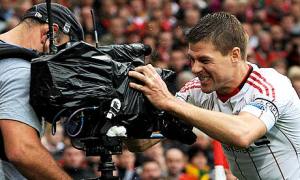 It’s been a very interesting week in the Premiership, with Arsenal and Manchester United both winning big yesterday, the title race has really become exciting at the halfway point of the season. A little bit of history was also made in the Arsenal match yesterday, as for the first time in Premier League history, no Englishmen were featured in the starting lineup of both squads. That’s right, Arsenal and Portsmouth featured 22 players, none of whom were English. I can already see Platini and UEFA waving their hands in complaint.
It’s been a very interesting week in the Premiership, with Arsenal and Manchester United both winning big yesterday, the title race has really become exciting at the halfway point of the season. A little bit of history was also made in the Arsenal match yesterday, as for the first time in Premier League history, no Englishmen were featured in the starting lineup of both squads. That’s right, Arsenal and Portsmouth featured 22 players, none of whom were English. I can already see Platini and UEFA waving their hands in complaint.
And the big news of the day from a financial standpoint is that, yet again, Portsmouth is in big financial trouble. The team was sold earlier this year by Alexandre Gaydamak to Sulaiman Al-Fahim about 5 months ago. Mr. Al-Fahim kept the club for a total of 42 days before he was bought out by Ali al-Faraj, the clubs current owner. The club is currently thought to be in a debt of around £75 million and that they need to magically come up with £30 million immediately just to keep the club operational. The HMRC (Her Majesty’s Revenue and Customs) department, which collects taxes among other things in the UK, issued a petition on Wednesday, as it seems the club still owes the government a few million pounds. The club expressed their feeling about this petition in a statement which claimed to be “surprised” by these actions.
The club has made a bit of a turnaround though, as earlier in the year their debt was around £100 million, meaning there has been some reduction. However, there is still need for more cash-flow into the club, and thus Portsmouth have begun actively looking for a third-party to invest in the club, as ESPN’s soccernet is reporting. To date, no Premiership club has gone into administration since the league was created in 1992. Leeds United is probably the most famous example of a professional football club in England which was placed under administration in 2007. Only a few years earlier, the club had been competing in the UEFA Champions League, but overspending on player salaries and transfers sent the club into a spiraling debt, in which they were forced to sell away their best talent, their stadium, and training grounds. Demoted to the Championship, they voluntarily entered administration and docked 25 points sending them down to League One, the third tier of professional football. The club is now financially stable, and looking to work its way back up, however the question remains whether Portsmouth will see a similar fate.
On one final note, with UEFA fast demanding that clubs get rid of debt in order to play in Champions League, Chelsea has announced that they are virtually debt free. The current leaders of the Premier League claim to have cleared the £340 million debt. Notably, the debt was almost entirely loans made to the club by current owner Abramovich, who had complained earlier this year to UEFA President Platini about how ridiculous that costs for player transfers were becoming. It is thus, Chelsea have converted all the outstanding amount of the loans into equity, and are now supposedly compliant with the new UEFA mandates which are set to be imposed on teams in European competitions in 2012. I don’t find it the least bit surprising that the man who was complaining about costs has done this, so Platini can now claim that if Chelsea has become compliant, so can the other teams in Europe.
I wonder how much this week will change things in European football. Chelsea becomes compliant, a Premier League game has no Englishmen start in it for the first time in history, and another club falls deeper into danger of administration. Platini has already made the case to the European Union that sport should be considered a special case when considering the current EU labor laws, and should be able to ignore them in order to preserve financial fair play. Platini is also one of the advocates for limiting the number of foreign players on a clubs roster, and has claimed he would not fight the EU over this matter. Of course if Platini can gain sport “special status” in Europe, maybe he’ll be able to make the case for limiting the number of foreign players on a club as being inherent to his crusade of creating “fair play” in Europe.



 Posted by nickwatanabe
Posted by nickwatanabe 


